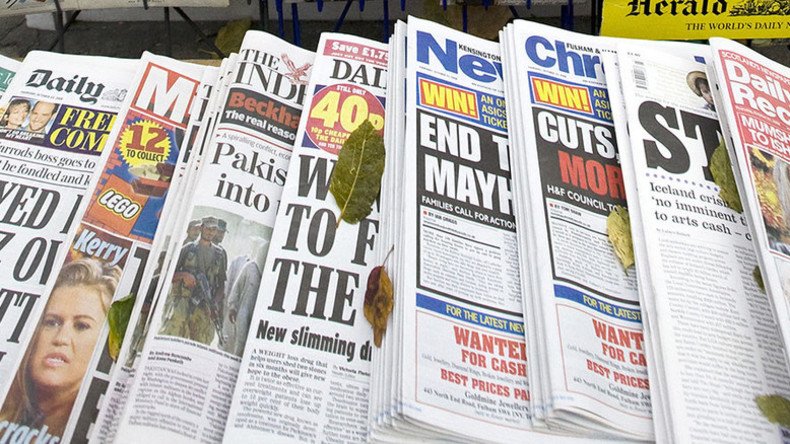Mainstream media react to Syria airstrikes vote

Mainstream media were whipped into a frenzy on Wednesday night when British MPs voted in favor of extending airstrikes against Islamic State (IS, formerly ISIS/ISIL) from Iraq into Syria. RT contributor Ben Church examines the headlines.
The morning after MPs overwhelmingly backed Prime Minister David Cameron’s motion to bomb Syria, the nation’s newsstands bulged and televisions blared with editorials for and against the vote’s outcome.
What was the Fourth Estate’s verdict on war?
Do we know what we’re doing?
The right-wing Daily Mail remained hesitant over the decision to engage in airstrikes. The paper ran with a headline questioning the strategy behind the call for war.
Thursday's @DailyMailUK#MailFrontPagespic.twitter.com/VM1ZpmMJgV
— Daily Mail U.K. (@DailyMailUK) December 2, 2015The Mail’s political editor James Slack warned British ground troops may need to be deployed if airstrikes alone fail to dislodge IS. He quoted former Foreign Secretary William Hague, who said Britain should not “rule out ground war.”
The center-left New Statesman magazine is equally unsure, running the cover headline ahead of the vote “Syria and the impossible war.” It questions the government’s follow-up strategy, asking whether MPs actually “know what they’re doing?” The stance is resonant with much of the population, who remain unconvinced of the case for airstrikes.
A first look at this week's magazine | Syria and the Impossible War https://t.co/lDAHAs39FYpic.twitter.com/crHPAg4T7i
— New Statesman (@NewStatesman) December 2, 2015Cameron’s War
Many left-leaning papers are placing responsibility firmly on the PM’s shoulders. Just as Iraq became Blair’s War, Syria is fast becoming Cameron’s – his destiny now forever tied to the conflict’s outcome.
The Mirror bluntly ran the headline “Cam’s War” in an effort to make the PM entirely culpable for the bombings. The tabloid points to recent poll data suggesting widespread public opposition to airstrikes, setting the Conservative leader up for a fall.
Tomorrow's Mirror front page: Cam's war.
https://t.co/XjsAVdqaKGpic.twitter.com/HXS9Mtz7Qp
— Daily Mirror (@DailyMirror) December 2, 2015The Guardian led with a striking image of Cameron’s face overlaid with a Syrian flag, further indicating Cameron’s ownership of the war.
The Guardian front page, Thursday 3 December 2015: MPs back Cameron over Syria airstrikes pic.twitter.com/ltvF61Oxrb
— The Guardian (@guardian) December 2, 2015Benn steals the show
The big story that emerged from the debate was the impassioned speech in favor of airstrikes from Shadow Foreign Secretary Hillary Benn. Defying his leader Jeremy Corbyn, and the will of the party membership, Benn stood in stark contrast with his father, the late Tony Benn, a titan of the British anti-war movement.
Tory MPs greeted Benn’s statement with rapturous applause. The right-wing press has largely followed suit. The Telegraph quoted Benn’s speech on its front page, glorifying the defiance of the Labour frontbencher.
Tomorrow's Daily Telegraph front page: The voice of defiance. pic.twitter.com/5ZLsZ2ucM1
— The Telegraph (@Telegraph) December 2, 2015The paper also noted it was a night where Benn not only looked like the leader of the opposition but “looked like the prime minister,” a headline directly calling into question the future of the Labour Party under Jeremy Corbyn.
The center-left Independent ran a similar story heralding Hilary Benn’s rousing display.
Matt Dathan, the Independent’s online political reporter, quoted Scottish National Party (SNP) MP Mhairi Black, who stated she “would never forget the noise of some Labour and Tory cheering together at the idea of bombs falling.”
The immediacy with which the airstrikes began after the vote shows how confident the PM was in achieving majority support for his motion. It also showed how unfazed Cameron was by the protests in Parliament Square. The Independent’s concise daily i newspaper offered a juxtaposition of Cameron making his case for war inside Parliament as hundreds of anti-war protesters rallied outside.












